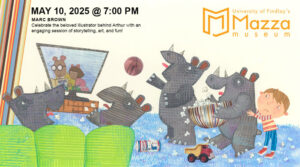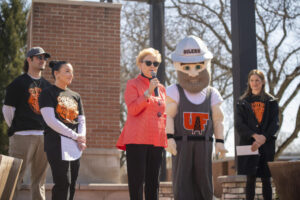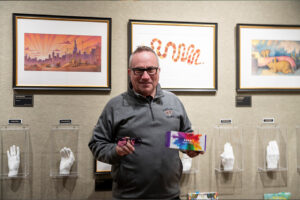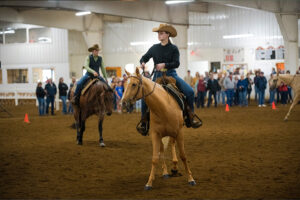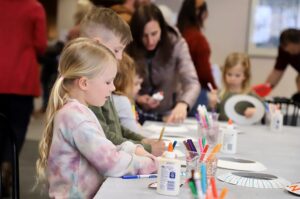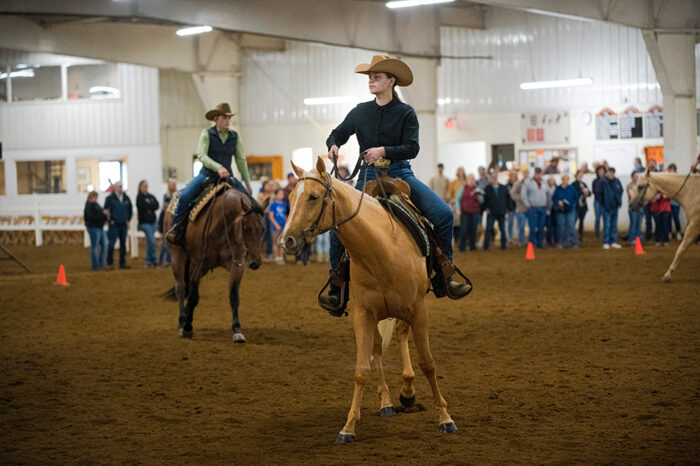Canine Cuddles: A Love that Only a Pet Can Give
If you’ve ever had a devoted pet, you know the feeling. You go away for a length of time, maybe for a vacation or a weekend getaway, and leave your pet behind, only to miss them terribly and spend most of your time wondering if they’re okay. When you’re a student and leave home for a semester of college, perhaps for the first time, this feeling is often magnified several times over, and it’s a struggle to get used to a life without your trusty, furry sidekick. Every dog or cat you see brings thoughts of home, and the paw-tugs on the heart get stronger with every passing day. Students might even call home and ask if they can “talk” to their pet, just so they can hear him or her breathe or purr into the phone. The good news is that, once a week, there is welcome relief and reassurance that only a pet can give right here on the University of Findlay campus, and within the community.
For around three years, different therapy dogs and their owners have been coming to the Alumni Memorial Union on Mondays from 3 to 4 p.m. for “Canine Cuddle” time, sponsored by the Offices of Disability Services, Counseling Services, and Student Activities, Commuter Services, and Leadership Development. According to Lori Colchagoff, director of Disability Services, there are currently four students who have emotional support animals living with them on campus, but, in keeping with the Fair Housing Act, these animals are required to stay in the dwelling they share with their owner and cannot be brought out into campus. For everyone else, there are pet owners like UF alumnae Angie Schimmel and Sharinda Welton, who, along with their dogs, are a part of the effort to lend non-judgmental ears to students at UF, programs for senior citizens, and the children’s literacy effort at local elementary schools and the Findlay-Hancock County Public Library. Schimmel and Gibbs, a four-year old Golden Retriever, and Welton, director of Student Activities, Commuter Services, and Leadership Development and her dog Mishka, a 10-year old Short Hair German Terrier/Border Collie mix, all value their time helping to soothe students’ end-of-semester angst. Welton said, during the recent Toys for Tots Christmas party where Mishka served as Santa’s Helper, that being involved “provides a purpose” for her dog and creates “big smiles and open arms” for the students. She added that both Mishka and the students can “relax and engage” with each other, leading to a win-win situation for all involved.
After one look at how Gibbs responded to the students who approached him, it’s abundantly clear that he and this program are especially worthwhile, as well. Schimmel said that dogs like Gibbs “bring comfort and won’t judge,” which is important for students who are consistently under a microscope in the form of grades, presentations and projects. As Gibbs posed for pictures, happily received affection, and showed genuine interest in the students who intended to stop by to spend only a brief stretch of time with him, something interesting happened: that brief time turned into longer spells, the students patently relaxed and, if only temporarily, were unaware of the pressure that they were under to wrap up a semester successfully. Colchagoff shared that students are often so enamored that they share stories of their own pets and even break out pictures of them when they visit the dogs, frequently wondering how they can get involved with the program, too.
When asked if there was a particular time when she had become aware of the wonderful merit that these therapy animals can bring, Schimmel recalled that she once witnessed a small child at the Findlay-Hancock County Library who was initially extremely shy and anxiety-filled about reading aloud. Over the course of some months spent getting to know and reading to the dogs, however, the little girl became well-adjusted and, even more important, confident enough to support other kids who were suffering from similar afflictions of self-doubt. That story and the reassured looks on the UF students’ faces after their stints with Gibbs “absolutely reinforces that what I and my dogs do is important in ways that can make a huge difference,” Schimmel said, “and that’s what keeps me doing it.”
If you want to know more about the “Canine Cuddles” program, contact Lori Colchagoff.
